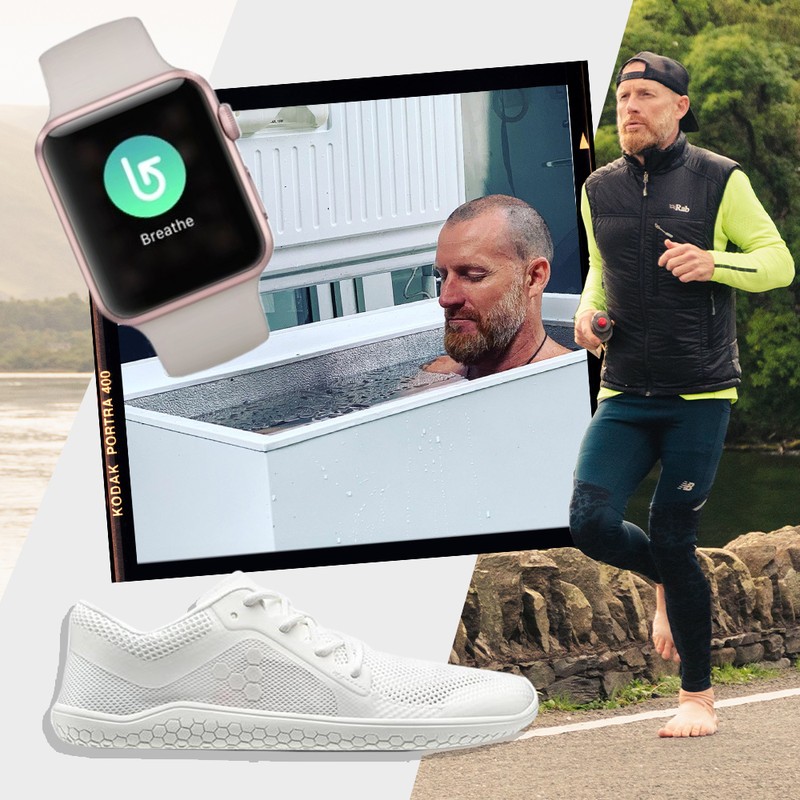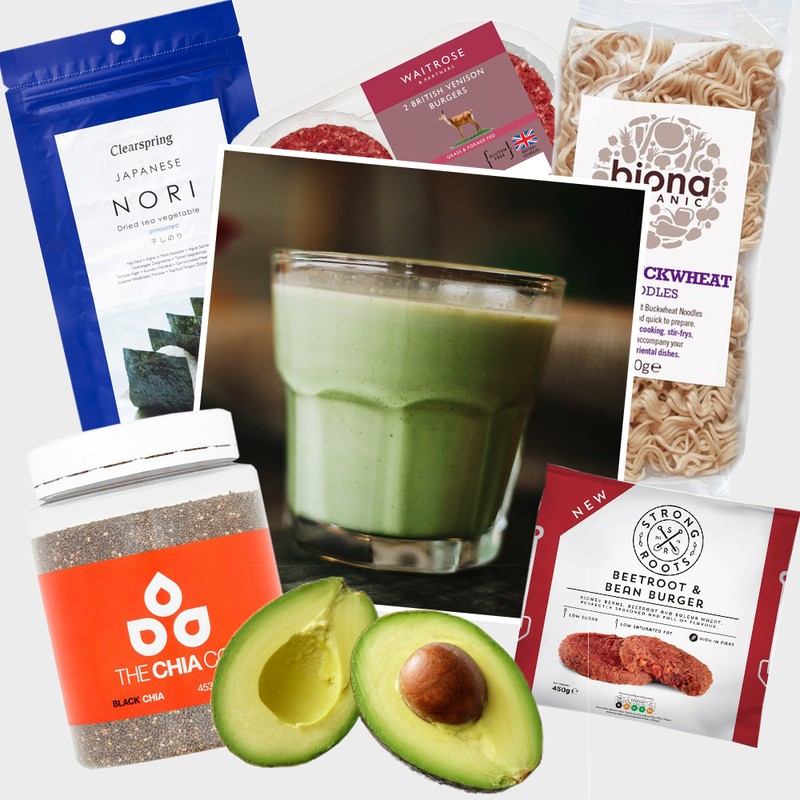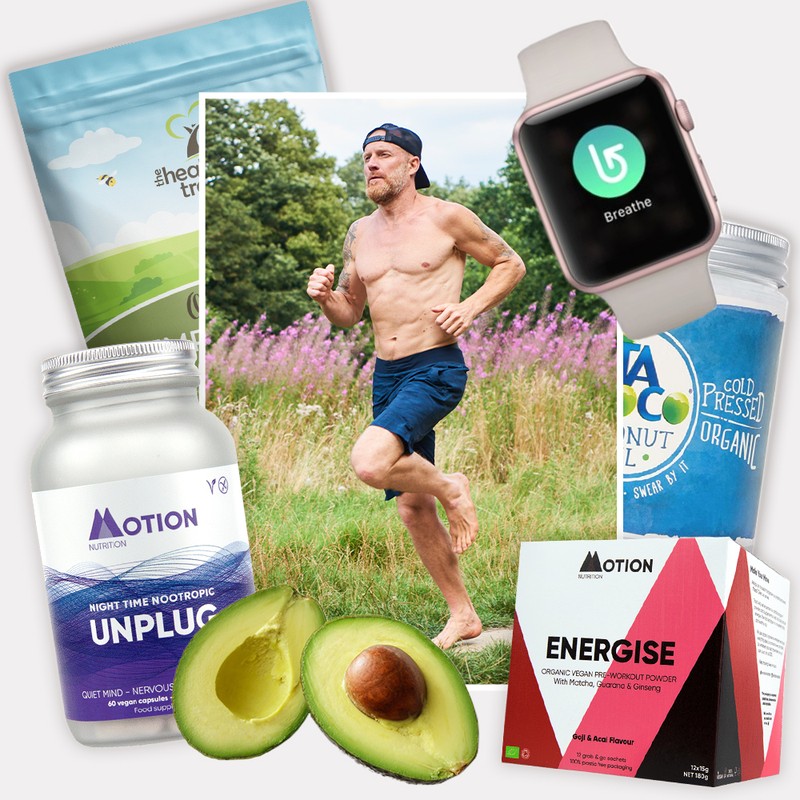Tony Riddle: My Health Rules
My days start early. I’m a father of four, so I try to get up before the tribe wakes. I try to start my day with 100 cycles of nasal breath and intention setting before spending some time in nature – pre-lockdown, that was a barefoot trot to the Hampstead ponds for some breath and cold immersion. I see cold water as a micro hit of adversity that helps me access inner calm – it’s an essential part of my day. At the moment, I’m unable to get to the ponds, so I use my chest freezer for an ice bath at home. I find these self-induced micro hits of adversity help to shake up our resilience to our perceived reality – we need this now more than ever. If you haven’t got access to a garden or outside space, then breath work and cold immersion are all modalities in which we can tune into the frequency of our internal natural worlds without stepping a foot in nature.
I’m an ultra-endurance athlete. Last year, I ran 34 barefoot marathons in 30 consecutive days, equivalent to the length of the UK. I’m currently training for my next challenge – I’ll be running 485 miles in nine days, completing the entire Three Peaks Challenge from Snowdon (Wales) to Scafell Pike (England) to Ben Nevis (Scotland) including the roads in between. This means that most mornings, I’m out training, getting the miles in and running barefoot in my Vivo’s (barefoot shoes) on Hampstead Heath.
Breakfast consists of a green smoothie. I make mine with avocado, banana, spirulina, chia, chlorella, hemp protein, Motion Nutrition protein powder, celery, cucumber and kale for 100% plant gains. The whole family is also big on pancakes – I have buckwheat pancakes a couple of times a week. We always sit down to have breakfast together and at every meal we practise mindful eating, which includes gratitude practice (to the plants and food on our plates) and breath practice, which aids digestion.

I believe in re-engaging common sense when it comes to food. Making choices about what to eat requires a level of skill way beyond what our ancestors had to conjure when feeding themselves. Guided by an ancient emotional brain and bombarded by advertising and marketing campaigns, it’s no wonder things get confusing; what carbs, what sugars, what fats – the list is endless. My philosophy when it comes to food is: if it’s natural you can eat it. Always use nature as your filter.
My diet is 95% plant-based and organic. Over time, I’ve figured out what works best for me and my digestion, sleep and energy levels. I operate best on a diet that’s heavily plant based, sugar free, grain free, dairy free and egg free. I eat wild meat, either venison or boar, once a week.
I’m a big snacker. I love nuts from Forest Whole Foods and am also a fan of nori seaweed wraps – they’re great for wrapping up salad and having on the go.
At dinner I focus on fibre and fats. A typical dinner for us might be homemade black bean burgers with green salad and sweet potato fries. There’ll always be something raw or fermented (i.e. sauerkraut or pickles) on the plate, as well as some greens and fats like coconut oil.
I order a Riverford Organic vegetable box every week. It’s full to the brim with greens. As well as this, I’ll always buy avocados, bananas, nuts, coconut oil, buckwheat noodles, chia seeds and matcha tea.
I don’t take lots of supplements. But when I do, I always look to Motion Nutrition – its products are made from 100% natural, organic ingredients and have the Soil Association Stamp. When I’m training, I take the Energise Blend, which is organic and contains matcha, lucuma, guarana and panax ginseng – it’s a game-changer on dark, early mornings. I also use its blueberry plant-based protein and sleep nootropic.
We all need sleep, food, water, sunlight, movement, play and human contact to survive. But to thrive, we need deep sleep, nourishing food, fresh water, direct sunlight at the right times of the day, free movement and play, and supportive, nurturing human contact – all of which feed our emotional health and wellbeing, and enable us to grow. This means getting in touch with what’s biologically normal, as opposed to what’s socially normal. Nature, natural movement, play, cold immersion and breath work all come into play most days for me.
At home, I’ve adopted ground living. The average urbanite spends 90% of their life indoors, removed and disconnected from nature. Sitting for long periods of time creates stagnation and encourages lack of movement, so I made the decision to remove all chairs from my home. We sit on the floor on cushions or bolsters, or we sit in a squat – or the many other natural rest positions available to humans. For example, when I’m working from home, I have a low sitting desk set-up. This means I can transition between ground sitting positions to help unravel, keep supple and strong. I use floor-sitting positions to help maintain my posture and athleticism.
I bring the outdoors in. Plants are a great way to purify the air inside your home and can help reduce levels of cortisol, the stress hormone, which will keep your body in a ‘rest and digest’ state. If you’re breathing the same air for six to eight hours, you’ll want it to be free from neurotoxins, pollution and pollen, especially if you suffer from hay fever.

Sleep is one of my health priorities. It’s fundamental to maintaining optimal health. But it is, in fact, the quality of our sleep habits and habitats that dictate its positive effects on our health, not the number of hours we clock up in the land of nod. Over the years, I’ve refined my sleep rituals to optimise my sleep environment. I choose to sleep on an organic woollen mattress topper without a mattress – the floor and the topper create a really firm sleeping experience. I only use organic natural fibres when it comes to bedding, and use circadian lighting throughout the house, which helps support sleep hormones and balance our sophisticated regulatory systems.
If I feel stressed, I get outside. Getting out into nature keeps me clear headed, connected and on my A-game. Studies suggest there are myriad health benefits to getting outside: reduced stress and inflammation, increased cardiovascular health and immune function, better sleep and faster recovery times. Breathing is also a powerful (and cheap) tool to regulate stress. Try inhaling for a count of four and exhaling for a count of six. A longer exhale lowers your heart rate and blood pressure. The Breathing App is brilliant and worth a try – set it for three to five minutes on a 4:6 ratio.
Subscribe to the NatLife Tribe for weekly coaching and online tutorials. Follow Tony at @TheNaturalLifestylist or for information on one-to-one coaching, visit TonyRiddle.com
DISCLAIMER: We endeavour to always credit the correct original source of every image we use. If you think a credit may be incorrect, please contact us at [email protected].


